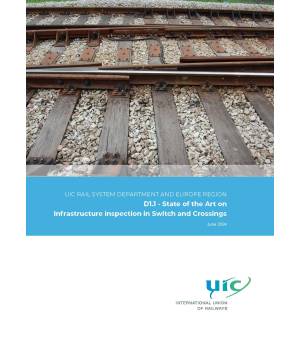
D1.1 - State of the Art on Infrastructure inspection in Switch and Crossings
Over the entire cycle of railway systems, many inspections and maintenance actions should be concerned.
Only in this way availability, reliability and safety in the railway infrastructure can be guaranteed. The results of manual inspections are usually recorded by railway staff on measuring sheets or electronic systems. This type of inspection is currently already standardised in most railway companies. It is time-consuming, staff and cost intensive and requires that the railway staff are in dangerous zone of rail operation.
The aim of the inspections is to record the current condition of the inspected components and depending on the condition and the defined limit values of the components, initiate either maintenance or repair measures.
Significant larger and more consistent amounts of data required for predictive maintenance than can achieved with the currently manual methods. For this, it is also important to find the same verification steps and verification algorithms to obtain a high level of comparability for all figures.
This can only be achieved through automated procedures with robots or other regulatory processes. The framework condition must reflect the applicate guidelines and withstand evidence of the same level of safety.
The network performance needs to be optimised by real-time traffic management, maximising capacity, optimising energy and minimising inconvenience to the passenger and the freight user. In that scenario, on the rare occasions when disruption occurs, services are automatically and dynamically reconfigured and customers advised.
| Author | UIC |
| ISBN | 978-2-7461-3413-3 |
| Pages | 68 |
Data sheet
- Language
- English
- Format
- Downloadable
- Edition
- Ed. no.1
- Edition date
- 01/06/2024
- Publication date
- 17/12/2024
- Page number
- 68
- Theme
- Infrastructure Infrastructure Technology Technologie Terminology Terminologie
- sku
- 5-24015E-PDF
- Reference
- 5-24015E
 Cookie preferences
Cookie preferences

